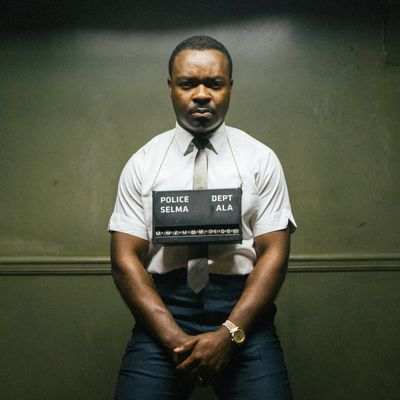
It’s that special day of the year when — after scores of lesser awards events, millions of screeners, and billions of prognostications — we say good-bye to so many of the actors who didn’t play characters with wasting diseases or got martyred or didn’t campaign enough or campaign in the right way or have enough money for a proper campaign or weren’t Daniel Day Lewis or Meryl Streep. We say good-bye to great artists who didn’t luck out in the horse race that cinema — like everything else — has become.
Let’s get the obvious out of the way. David Oyelowo gave the best male performance of the year but lost out along with the rest of the folks from Selma — which got what I can only call a “token” Best Picture nod. People will likely cite the not-entirely unfair denunciation of the film’s representation of LBJ, which began with former Johnson aide Joseph Califano in the Washington Post. Others will say the DVD screeners weren’t in the mail soon enough — which, if true, is almost too depressing to contemplate. Next year, screeners will either be hand-delivered or cars will be hired to transport voters to and from special screenings. I tend to think that the Academy collectively thought it had discharged its duty to the African-American experience with 12 Years a Slave. How else, in a year in which black people confronted inequality with greater urgency than any time in the last 50 years, can you account for the omission? You say it wasn’t a very good movie? You’re wrong. Selma has scale and depth. Ava DuVernay was robbed.
Bennett Miller and his ponderous Foxcatcher benefited. What can one say about this dim, drawn-out, uninsightful movie except that it wore its artistic credentials so ostentatiously that some Academy voters fell for it? I don’t want to complain too much about the nomination of Steve Carell, whose transformation was — at least before he began to repeat himself — impressive, and Mark Ruffalo grounded the film in something halfway human. But with Selma and the magnificent Mr. Turner — brisk, glancingly penetrating, one of the least artsy films about a major artist ever made — available, the tackiness is breathtaking. Timothy Spall, we hardly knew ye.
At least Marion Cotillard slipped in for Two Days, One Night — though she was even better in The Immigrant. If the too-glum Jennifer Aniston had brought more comic energy to Cake, she might have made the grade. It’s a much better script than the draggy film suggests. Anyway, Julianne Moore is a lock for the victim of early-onset Alzheimer’s in Still Alice, and here’s to her. She’s one of our most fearless, hard-charging actors and has earned — after years of toiling in mostly indie projects — Hollywood’s ultimate accolade.
American Sniper did amazingly well given how despicable it is, but its strong box-office showing and the well-organized hate campaign against anyone who protested its flagrant inaccuracies and the way it affirmed the nonexistent connection between 9/11 and the cataclysmic U.S. invasion of Iraq evidently counted for much. It was also a tribute to the bizarre standing of Clint Eastwood, whose omission from the Best Director category was probably the result of his semi-demented monologue to an empty chair at the last Republican National Convention. A curious split vote, but explicable.
Birdman was expected to do well, and did, very, very — and I can’t imagine how the Brits Cumberbatch and Redmayne won’t cancel each other out and throw the award to Michael Keaton for his furiously self-pitying turn as a washed-up superstar. I love Keaton — always have — and when he wins here, it will be further proof that lesser performances of major performers are often the ones that win awards. I expect the contest will come down to Boyhood (the year’s best movie) versus Birdman (the year’s most overrated) and, alas, give the latter the edge. Keaton and Edward Norton — who brilliantly sent up his own reputation for being a colossal dick — will likely win, and the movie’s jabs at critics won’t hurt. For the former, only dear Patricia Arquette and the screenplay seem like locks.
That The Theory of Everything — an increasingly aimless mess — won a screenplay nomination is high hilarity. Almost as off is the nomination for Felicity Jones, who is meltingly, maddeningly beautiful in the film and potentially a major actress but can’t elevate a dud part. Emily Blunt — who carries much of Into the Woods with her marvelous farcical energy — evidently never had a shot.
I was surprised by every documentary nomination apart from Citizenfour, which will deservedly win, and rather pleased by the inclusion of The Last Days in Vietnam. But I am happy to see more life for Finding Vivian Maier for entirely corrupt reasons, having bought two of her photos. I’d like to thank the Academy … (Perhaps some members made similar purchases.)
The lack of a nod for The Lego Movie is a head-scratcher, but I admit that after an hour of being dazzled by its incessant invention, I fell off a cliff into fatigue and boredom. Look for Big Hero 6 to walk away with this award for all the obvious reasons. (It’s fun, not too artsy, not Japanese, and not a sequel.)
Big kudos to Damien Chazelle — whose low-low-budget first feature, Guy and Madeline on a Park Bench, more people should see — for his great Whiplash showing. And a tip of the beanie for Wes Anderson for doing it His Way and finally cracking the Hollywood code with The Grand Budapest Hotel. I’m not a Wes groupie but we need to treasure the artists who can attract both money and good actors while continuing to live in a hermetically sealed solipsistic bubble. And it is a sweet, sad film, which is the most important thing. Isn’t it?


